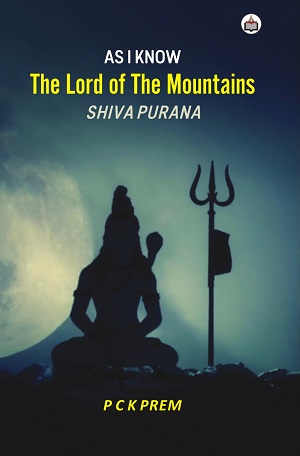Apr 18, 2025
Apr 18, 2025
by P C K Prem
As I Know: The Lord of the Mountains – Shiv Purana: 156
Krishna still wants to know more, and expectedly monk Upamanyu is happily willing to share thoughts with him… questions on yoga arise, he talks of the restraint on mind as karmas spread over to five wings and then he talks of the yoga of mind through the control on vital breaths etc.
 Krishna inquisitive exploration continues. He hears about the knowledge, rites and rituals and man’s karmas and nature, and the consequences of activities a living being indulges in life. Now, he wants to know about yoga and its nature. He talks of disciplining the mind, restraining of karmas and then, the wonderful advantages of concentrating on Shiva.
Krishna inquisitive exploration continues. He hears about the knowledge, rites and rituals and man’s karmas and nature, and the consequences of activities a living being indulges in life. Now, he wants to know about yoga and its nature. He talks of disciplining the mind, restraining of karmas and then, the wonderful advantages of concentrating on Shiva.
Concentration of mind and control of karmas i.e. activities that constitute five wings – Mantrayoga – it is fixing mind on mantra and practicing, Sparsayoga – with Pranayama it is sparsayoga, Bhavayoga – when one has no link with mantra it is bhavayoga, Abhavayoga – universe is the object of reflection without seeing is abhavayoga and Mahayoga – meditating on Shiva is mayayoga.
The great monk continues to define the nature of each yoga and thereafter, he tells Krishna that yoga consists of more branches or ancillaries namely – yama, niyama, asana, pranayama, pratyahara, dharana, dhyana and samadhi. Subsequently, he proceeds to explain each one so that one can practice yoga of different kinds and nature, and makes life healthy mentally, spiritually and physically.
All the above wings of yoga carry different attributes. Non-violence, truth, celibacy etc. are characteristics of yama. To stop the air entering the body is important. It is of three kinds – rechaka, puraka and kumbhaka – and the exercises relate to nostrils that infuse vigour in body. It is inhaling and exhaling of breath from each nostril with regularity. It not only purifies veins and mental condition but also energises body. All the branches of yoga teach that one should observe restraint and discipline body in totality. A man who wishes to know about the various aspects of yoga ought to know its details, practice it and discipline one’s mind and senses, and that makes life happy and significant.
To exercise complete control on vital breaths is important. One ought to pass through different stages of yoga and its various wings and only then, through the knowledge and active assistance of man perfect in meditation he can achieve what he intends. If he is aware of the object of meditation and understands the benefits of deep meditation it would be better. It is quite difficult but still realistic and within reach. Meditation grants freedom from otherworldly ensnares and visions and it paves the way to acquiring perfection – a kind of siddhi, for concentration on Shiva without thoughts of anything else – extraneous factors, is a path to the attainment of goal.
24-Aug-2024
More by : P C K Prem